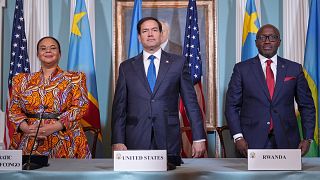HIV
Scientists would likely look into the potential of mRNA technology as the search for an HIV vaccine continues. This technology has become a game-changer helping scientist’s find a vaccine against the coronavirus.
At a virtual HIV Research for Prevention journalism fellows program, discussions also centred on the latest in HIV vaccine research.
‘’ It makes complete sense to investigate how we can do this. And so we have to do a reverse engineering. So as we have helped Zika, Ebola and Sars covid 2 and other things, we need to see how we can use mRNA in HIV vaccine research. There is a lot of work to be done for HIV vaccine research. And the question is whether we have the patience, after 705 and 706 to embark on another endeavor to find an HIV vaccine'', Glenda Gray a member of the Academy of Science in South Africa said.
Sharon Hillier is a microbiologist. Her research has focused on understanding both the preventive and causative roles that certain microorganisms in the vagina have with regards to genital tract infections, sexually transmitted infections including HIV and pre-term birth. She said the World Health Organization is expected to release guidelines for the use of the dapivirine vaginal ring. It is one of the latest products which should help reduce the risk of acquiring HIV during vaginal sex for women aged 18 years.
‘’The dapivirine vaginal ring is made up of silicon and it is impregnated with about 25 miligrams, so not very much drug called dapivirine. It is placed in the vagina, one for a month at a time. And essentially the phasery studies have been done. The European medicine agency, this past summer, gave a positive opinion. The regulatory submissions have been made to the US Food and Drug Administration and several African regulators. And the World Health Organization is expected to have guidelines for the use of dapivirine ring by women coming out, I think sometime this summer’’, Hillier said.
Concerns about equitable distribution of a future vaccine against HIV was brought to the fore. It comes as less wealthy nations lament about access to the covid-19 vaccines.
‘’ Even in the remotest areas of Zimbabwe, in the remote villages, we should be able to deliver these interventions. And we are going to decentralize. Just yesterday, some of my participants at the clinic were asking me when this injection is going to be available. Are we going to be able to afford it? And I did say that they must also advocate for it to be available in a timeliness manner and for it to be affordable’’, said Nyaradzo Mgodi, a Science Reviewer at the Medical Research Council of Zimbabwe.
Access to daily oral PrEP is rising around the world. But a daily pill is not a suitable or desirable prevention method for everyone. Today, women account for more than half of all people living with HIV globally.












Go to video
UNICEF marks World Malaria Day with rollout of new vaccine in Mali
Go to video
Lassa fever kills 118 in Nigeria since the start of the year
01:46
Ethiopia: HIV infections soar in post-war Tigray
Go to video
UNAIDS urges action to prevent HIV crisis globally
05:00
Breaking stigma, building hope: Gloria Nawanyaga’s fight for inclusion and empowerment
05:56
DRC: Malaria cited as cause of deaths, and infections in Equateur province